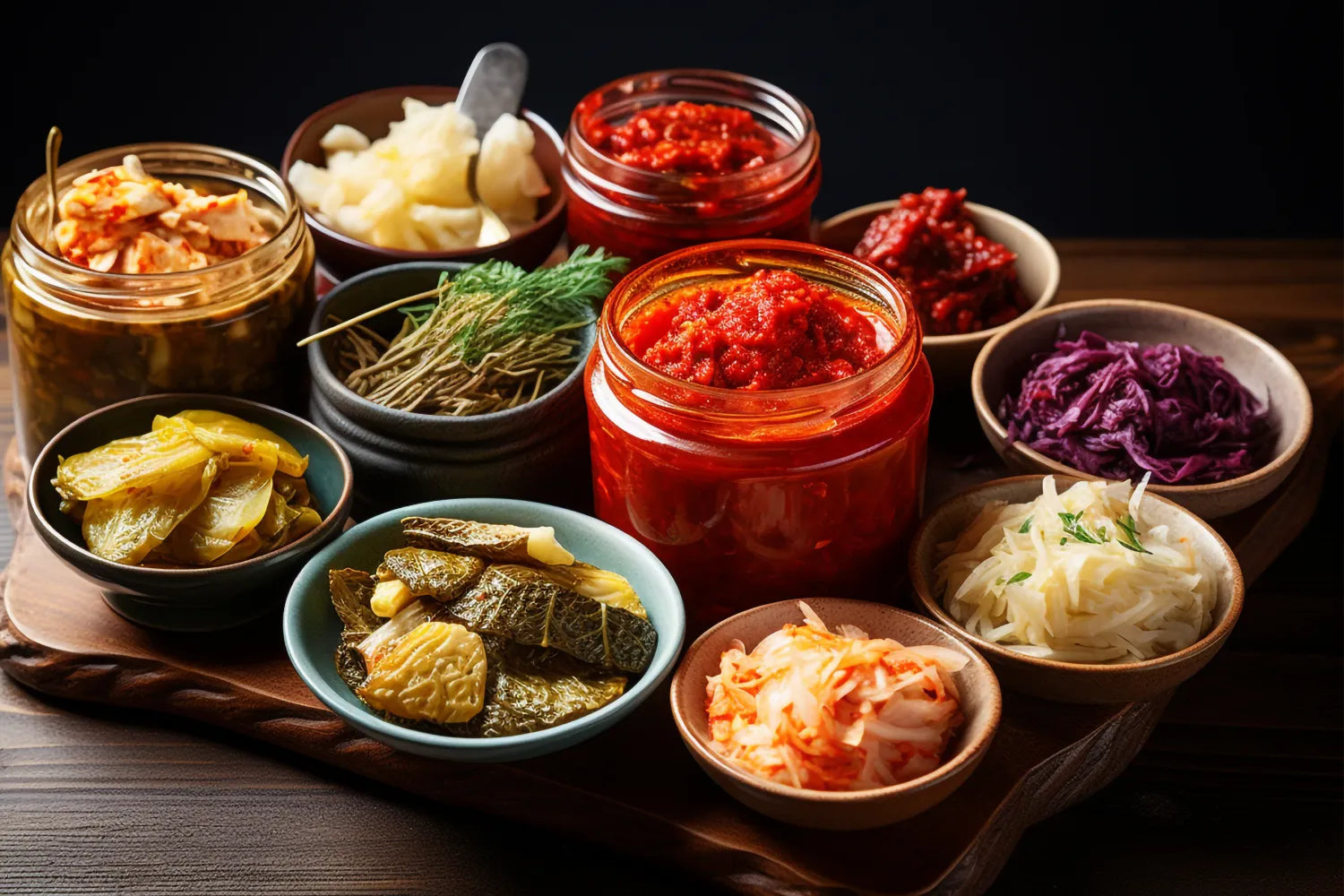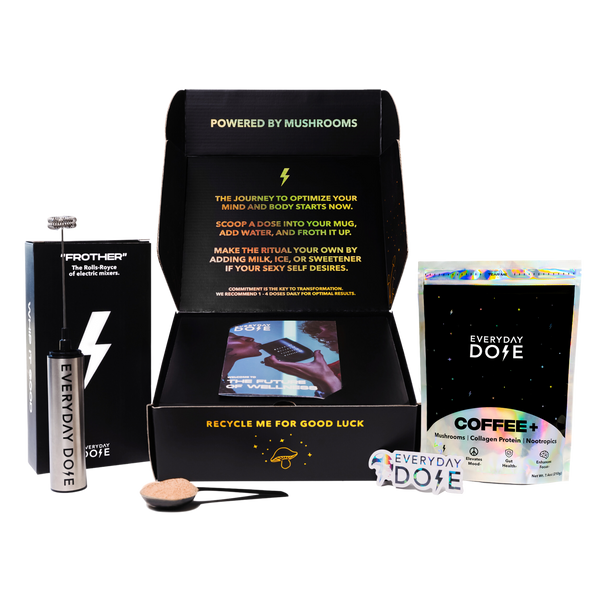13 Best Gut-Healthy Foods According to Experts

Did you know that the health of your entire body is dependent on your gut health? This might seem crazy, but the gut microbiome has health-supporting powers that we’re only just beginning to understand.
Naturally, it’s important to make sure your gut is running in tip-top condition. Here are 13 of our favorite gut-supporting foods.
What Makes a Food Gut-Healthy?
When you’re looking for ways to support your gut, food is usually the best place to start. Here are a few key gut-supporting factors to keep an eye out for.
Probiotics
What if we told you there were bacteria in your digestive tract? In fact, there’s an entire world of flourishing bacteria that live in your small and large intestines. Together, these bacteria make up the gut microbiome and help break down food in the digestive system.
Your gut microbiota exists in a delicate balance, and there are many things that can wipe out this healthy gut bacteria. For instance, certain foods, antibiotics, and even stress can affect the balance of bacteria.
Luckily, probiotic supplements and fermented foods contain the same type of beneficial bacteria. Eating these probiotic foods can help replace the good bacteria and support digestion.
Prebiotics
Prebiotics might sound similar to probiotics, but they have two different functions. While probiotics are the actual gut bacteria that live in your body, prebiotics are the food that helps them stay healthy and active.
Prebiotics are soluble fibers. Good gut bacteria feast on these prebiotic foods, fermenting them and gaining the energy they need to multiply.
Non-Irritating
Supporting your gut is not just about what foods you eat — it’s also about what foods you avoid. As we hinted at earlier, certain foods can actually irritate and damage your gut.
These include:
- Refined sugar
- Artificial sweeteners
- Processed foods
- Fried foods
- Alcohol
You can also damage your gut by eating foods you’re sensitive or intolerant to, such as lactose and gluten.
What Are the Best Foods for Gut Health?
Since food is the main influence on the digestive system, it makes sense that supporting digestive health starts with the food you eat. Eating whole foods is a great place to start, but which foods have more to offer? Here are the top 13 foods for gut health.
1. Sauerkraut and Kimchi
Sauerkraut and kimchi are very similar, with the former being made of fermented cabbage and the latter being made of other fermented veggies. The fermentation process allows the veggies to grow lots of good gut bacteria. It also gives them a tart, fermented taste that has made them staples in many Asian cuisines.
2. Whole Grains
Whole grains contain soluble fiber. While this isn’t prebiotic fiber, soluble fiber can help slow down digestion, which can give the body plenty of time to extract nutrients from the food.
Grains like rice, oats, quinoa, and barley fall into this category. Even though these can be good in moderation, it’s still important to limit your intake of these carbohydrates. Eating too many carbs can be hard on blood sugar and contribute to heart disease.
3. Jerusalem Artichokes
These aren’t the artichokes you might be used to. Jerusalem artichokes are skinny, brown-colored tubers that are native to North America.
These artichokes are rich in inulin, a type of insoluble fiber that works as a prebiotic fiber. Many people enjoy these fiber-rich tubers by roasting them up like potatoes.
4. Legumes
Legumes are a class of food that includes the following:
- Beans
- Peas
- Lentils
- Peanuts
- Chickpeas
- Soybeans
- Lima beans
Legumes contain prebiotic fiber and are also great sources of protein.
5. Kombucha and Kefir
Kombucha and kefir are fermented drinks that contain trillions of probiotics per cup. The active cultures used to make these drinks are rich in Lactobacillus bacteria, a type of bacteria that has the most important effects on gut health.
Kefir is a type of fermented milk that tastes similar to yogurt, while kombucha is a type of fermented tea. You can find both at your local health food store or make your own once you obtain an active culture.
6. Lion’s Mane Mushroom
Lion’s mane mushrooms are rich in beta-glucans, which act as prebiotic fiber. It can also help support balance within the digestive tract and defend your system against toxins and free radical damage.
Lion’s mane can also support focus and mental health, which is why it’s one of the ingredients in our Mushroom Coffee+. Plus, this functional fungus contains antioxidants, which can help support overall health for the long term.
7. Blueberries
Blueberries contain both soluble and insoluble fiber, although most of their fiber content is made up of insoluble fiber. Plus, blueberries are rich in antioxidants, which can support gut health by minimizing free radical damage.
Blueberries make a delicious snack and can also be used as a garnish for yogurt parfaits. You can also use them in smoothies to add a deliciously sweet, fresh flavor.
8. Leeks
Raw leeks are another great source of prebiotic fiber. If you’ve never tried leeks before, you’re in for a real treat.
These veggies are in the same genus as onions, shallots, and garlic, and you can use them the same way. Chop up your leeks and toss them in a pot with some oil to create a delicious soup base.
9. Cruciferous Veggies
Cruciferous vegetables are packed with fiber (are you seeing a theme here?) and also contain glucosinolates. These compounds can help reduce inflammation and bind to toxins, removing them from the body.
Cruciferous vegetables include:
- Broccoli
- Kale
- Spinach
- Cauliflower
- Brussels sprouts
- Collard greens
- Kohlrabi
- Arugula
- Bok Choy
- Cabbage
- Mustard greens
- Turnips
To enjoy these veggies, all you really need to do is smother them in olive oil and saute them in a pan with some salt, pepper, and garlic powder.
10. Collagen
Collagen is an important component of connective tissue, and it plays a major role in maintaining the elasticity of the gut. This protein helps support the lining of the gut, which helps keep food in the digestive tract and encourages easy digestion.
Collagen is another ingredient we’ve chosen to include in our Mushroom Coffee+ because of its health benefits. Aside from its effects on the gut, collagen can also support healthy hair, skin, and nails. All of our collagen is 100 percent grass-fed bovine collagen, so you can rest assured you’re getting the best of the best.
13. Greek Yogurt
Greek yogurt is similar to regular yogurt, but it contains more protein and is much more dense in texture. Essentially, yogurt is just milk that has been thickened with an active culture. This makes all yogurt, but especially Greek yogurt, a great source of probiotics.
If you do choose to eat yogurt, make sure you opt for yogurt without added sweeteners. Many artificial sweeteners and flavors can actually have negative effects on gut health.
What Are the Health Benefits of Supporting Your Gut?
Your gut is part of your digestive system, so it makes sense that supporting your gut would help with digestion. When your gut is running the way it should, you should have minimal indigestion, nausea, belching, bloating, constipation, and other signs of gastrointestinal issues.
However, gut health affects more than just digestion. For instance, 70 percent of the immune system is located in the gut. The gut also plays a huge role in mental health — as much as 95 percent of the body’s serotonin is made in the gut, and researchers are only just discovering the power of the gut-brain axis.
Maintaining healthy gut organisms can also help support heart health, healthy cholesterol levels, and even weight loss.
The Takeaway
Supporting a healthy gut isn’t just about feeling better after you eat — it’s also about supporting mental health and heart health. When you’re looking for gut-healthy foods, make sure to keep an eye out for probiotic foods, prebiotic foods, and minimally processed whole foods.
We understand just how important the gut is for overall health, which is why we’ve included both lion’s mane mushroom and collagen in our functional mushroom blends. We offer our Mushroom Coffee+ and Mushroom Matcha+ blends, both of which feature our proprietary mushroom blend. Try it for yourself today!
Sources:
If you want to boost immunity, look to the gut | UCLA Health








